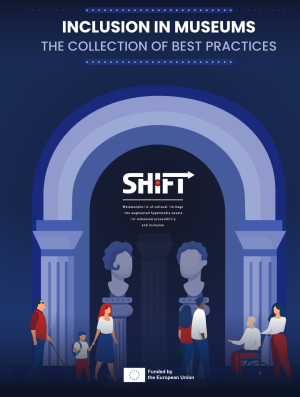
Museums hold a pivotal place in safeguarding cultural heritage and educating the public. Yet, true accessibility goes beyond merely ensuring physical access for visitors with disabilities; it also involves creating experiences that foster greater social inclusion. A new publication, Inclusion in Museums: The Collection of Best Practices, produced by the Balkan Museum Network as part of the SHIFT project, showcases how museums across Europe are embracing this challenge, making significant strides in inclusivity.
SHIFT is funded by the EU’s Horizon Europe program to make cultural heritage more accessible, inclusive and appealing using advances in technology.
This comprehensive publication, edited by Anida Manko and Milena Milošević Micić from SHIFT consortiun partner BMN, presents a wide range of inclusive practices from museums, galleries, and libraries across Europe, offering both inspiration and actionable insights for cultural institutions everywhere. Experts in the field share their experiences in breaking down barriers, whether architectural, social, or technological. They explore successes, identify obstacles, and discuss future strategies for making cultural spaces more accessible to all.
A key highlight is the work being done in Bosnia and Herzegovina, Montenegro, Serbia, North Macedonia, Hungary, and Romania. Museums in these countries are leading the charge, providing innovative examples of how cultural institutions can transform their approach to accessibility. By using multisensory environments, pedagogical adaptations, and digital platforms, these institutions are ensuring that visitors of all abilities have rich, engaging experiences.
The publication also underscores how the pandemic accelerated technological adaptations in museums. Institutions quickly embraced new tools, including QR codes, NFC, and VR, to maintain engagement with their audiences. These innovations have since become integral to enhancing accessibility, showing how technology can foster inclusivity in times of crisis and beyond.
Moreover, this work celebrates the principle of “Nothing About Us Without Us,” highlighting collaborations between GLAM (Galleries, Libraries, Archives, and Museums) professionals and persons with disabilities. These partnerships ensure that accessibility efforts are genuinely participatory, catering to the needs and preferences of diverse visitors.
Produced within the framework of the SHIFT project, which is funded through the Horizon Europe program, the publication supports the initiative’s broader goal of transforming cultural heritage by developing cutting-edge technological tools that enhance accessibility and inclusion, leveraging artificial intelligence, machine learning, and other advanced methodologies.
This new publication is a must-read for museum professionals, policymakers, and researchers, showcasing not only the progress made but also the ongoing challenges faced by cultural institutions in becoming fully inclusive. It serves as both a source of inspiration and a call to action, encouraging museums across Europe to continue their work towards creating spaces where everyone feels welcome.
Download the e-book here.
Audio book coming soon!

